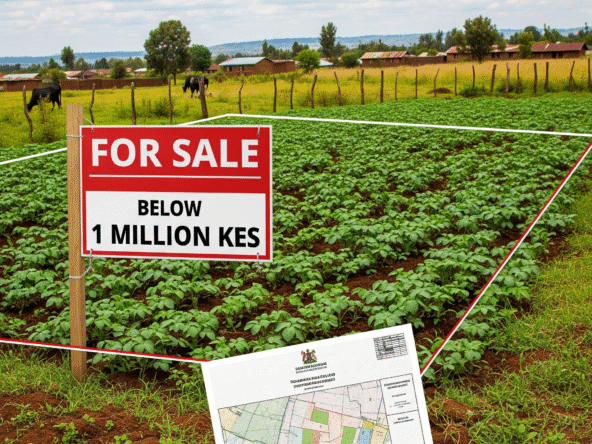Buying land in Kenya is a major milestone but for first-time buyers, it can be risky if you don’t know what to look for. From fake titles to hidden development costs, small oversights can lead to major losses.
Whether you’re eyeing a plot in Ruai, Matuu, or planning to develop a low-cost home in Kisaju, this guide outlines the most common mistakes first-time land buyers make in Kenya and how to avoid them.
1. Skipping a Title Deed Search
Many buyers rely on verbal promises or flashy brochures, but the only way to confirm ownership is through a title deed search at the Ministry of Lands.
A search will reveal:
- If the seller is the actual owner
- Whether the land has outstanding loans or cautions
- If the land is earmarked for compulsory government acquisition
For buyers using an agent or relative to represent them, refer to What Is a Power of Attorney in Real Estate? to understand how to protect your interest.
2. Ignoring Soil Type and Drainage
Not all land is buildable. Many first-time buyers only realize the problems after purchase, especially when the land:
- Has poor drainage
- Is in a flood-prone area
- Contains black cotton soil, which requires costly reinforcement
Visit the site during the rainy season, and conduct a basic soil test. This is especially important when installing systems like low-cost septic tanks or soak pits.
3. Not Checking Zoning and Utility Access
Just because land looks residential doesn’t mean it’s zoned for housing. Always confirm land use regulations from the county government or planning office.
Check whether the area has:
- Water and electricity access
- Public road connection
- Zoning for your intended use (residential, commercial, or agricultural)
Plots with some infrastructure like those referenced in Low-Cost Fencing Ideas can save you development costs later.
4. Falling for Unrealistic Deals
If a deal seems too good to be true, it probably is. Red flags include:
- Sellers who won’t allow a site visit
- Pressure to pay without paperwork
- “Limited-time offers” from unverified sources
Avoid cash deposits without receipts. Always transact through a licensed land agent or lawyer. After purchase, use vetted professionals as discussed in Hiring and Managing Contractors.
5. Ignoring Full Development Costs
Cheap land can come with expensive follow-ups. Before buying, factor in:
- Fencing or boundary walls
- Soil leveling or filling
- Access road improvements
- Drainage and water connection
To plan accordingly, check the guide on Perimeter Wall Materials and how they affect overall project costs.
6. Overlooking Future Appreciation Potential
Don’t just buy based on price or emotions. Evaluate the location’s long-term value:
- Is it near an upcoming highway or bypass?
- Are there schools, shops, or public amenities nearby?
- Are utilities like internet or electricity expanding into the area?
These clues help determine whether your land will gain value, as seen with areas highlighted in Green Building Trends.
7. Failing to Document Payments
Many first-time buyers lose money by paying in cash without proof. Always:
- Use a sale agreement drafted by a lawyer
- Get signatures from witnesses
- Pay via mobile money or bank for a paper trail
Verbal agreements, no matter how trustworthy they seem, can be contested in court.
Buying your first plot in Kenya is achievable but only if you take a cautious and informed approach. Don’t skip the title check. Don’t ignore soil or zoning issues. And never pay blindly.
Land is one of the best long-term investments in Kenya but only if you do it right.


